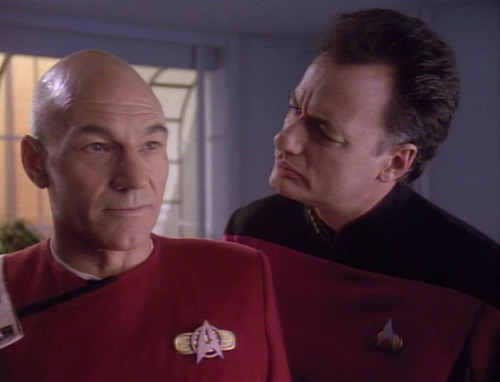By
Hazel Speed
Q is a letter of the alphabet and is also utilised as itself within literature, films and television.
Q we all know, from James Bond, stands for the Quartermaster who provides 007 with so many life-saving and diverse pieces of equipment, tiny or large whether function be a mix of humorous and serious. They offer a well-loved and integral facet of that genre, as do the actors ascribed to be the persona of Q.
However, as a Philosopher, I was smitten by the character of Q in Star Trek – especially the Voyager Series.
Although not really a Trekkie, I enjoyed all the earlier years as they materialised (teleportation joke there), but my favourite of all was the Voyager Series, albeit I am still trying to work out the ending of that last episode!
Previous series and crews – DATA in particular – had fascinated me until the emergence of the Doctor, especially as I once worked with someone who was his ‘double’ both in appearance, mannerisms, interests and nuances. Spooky that!
With Voyager however we had a type of space equivalent to that of Upstairs Downstairs. They represented an inclusive family with the lead female role being key of all their endeavours, a matriarch, with a whiskey voice like Katharine Hepburn and displaying the intestinal fortitude of John Wayne in every situation. Amazing.
However within that formidable exterior was empathy and caring for her crew/friends.
Although Q was a character who made ad hoc guest appearances throughout the genre, there was one episode in particular which was glorious where Q left his son with Kate Janeway, (the Star Ship’s Captain) in an effort to educate him as to what it was like to be mortal, i.e. live without special powers; you see Q was what we would consider to be Omnipotent (the God aspect never quite addressed).
He and his son, therefore, knew and could travel to, the past, present, or future by the click of a finger, a wish or a thought, much to the annoyance of the Captain and Crew.
When the son was having trouble adapting to ordinary life, (forgetting for the moment that included zooming through space ‘warp speed’), his Father, Q, would turn up again and during one unforgettable scene, he threatened he would put him in the round petri dish Q showed to his son, adding the remark that the alternative was to live in “single, cellular City!”
Quite a catchy term though also not easy to say!
The storyline has its moments of pathos, humour and philosophy.
It begged the question in a few regards and Q was also a joker, he would set metaphorical and actual events into action, traps for Voyager, its Captain and Crew. Costumes and time frames were also part of his props and impromptu settings.
However, the philosophical aspects, actual, discussed, or inferred, really were well expounded and could have led to a spin-off series.
Recently I heard a discussion regarding Star Trek being a learning tool, which indeed it is. How people of all nations, genders and species, totally different to the mortal human form can co-exist, thereby benefitting from such cohesions as a whole. A variety of inherent skills yet adjusting to and accommodating a diversity of weaknesses and inabilities. A type of all-encompassing, Spockian ‘mind-meld’ as Trekkies might say.
When they explore the solar system to search for and find new life forms, they do so with split infinitive at hand, to “boldly go” etc., but not to harm.
A lesson for us all. Why is it that the perfect world only seems to be achievable within fiction?
For some of us mortals “boldly going” to our earthbound supermarkets every day, nearly being pushed off pavements by groups of inconsiderates, we can be forgiven if we instantly ascribed the title of ‘Klingons’, whereas a bus full of teenagers wired up to technology bring other categories to mind, to such as the Borg!
Hazel Speed
Photo (c) Hazel Speed – used by kind permision to Tuck Magazine



No Comments Yet!
You can be first to comment this post!